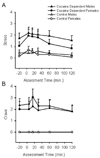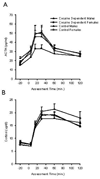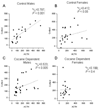Response to corticotropin-releasing hormone infusion in cocaine-dependent individuals
- PMID: 19349312
- PMCID: PMC2696287
- DOI: 10.1001/archgenpsychiatry.2009.9
Response to corticotropin-releasing hormone infusion in cocaine-dependent individuals
Abstract
Context: Corticotropin-releasing hormone (CRH), through the hypothalamic pituitary adrenal axis and other brain stress systems, is involved in the emotional dysregulation associated with cocaine dependence. Little is known about the response of cocaine-dependent individuals to CRH administration.
Objective: The primary objective was to examine the hypothalamic-pituitary-adrenal axis and the subjective and physiologic response to CRH in cocaine-dependent individuals and controls.
Design: A case-control study.
Setting: Subjects were admitted to a General Clinical Research Center for testing and abstinence was verified with a urine drug screening.
Participants: Participants were male controls (n = 23), female controls (n = 24), cocaine-dependent men (n = 28), and cocaine-dependent women (n = 25). Individuals with dependence on other substances (except caffeine or nicotine) or with major depression, posttraumatic stress disorder, bipolar disorder, or psychotic or eating disorders were excluded.
Intervention: Subjects received 1 microg/kg of CRH intravenously.
Main outcome measures: Primary outcomes included plasma corticotropin levels, cortisol levels, and heart rate and subjective measurements.
Results: Cocaine-dependent individuals exhibited higher stress (P < .001) and craving for CRH compared with controls. A positive correlation (r(s) = 0.51; P < .001) between stress and craving was found in cocaine-dependent subjects. Intravenous CRH elevated heart rates in all groups; however, cocaine-dependent women demonstrated a significantly higher heart rate at all time points (P = .05). Women had higher cortisol responses to CRH (P = .03). No effect of cocaine status was observed. The corticotropin response to CRH was independent of sex and cocaine dependence. Cortisol and corticotropin were positively correlated in the controls and cocaine-dependent men, but not in cocaine-dependent women (r(s) = 0.199; P = .4).
Conclusions: There is an increased subjective and heart rate response to CRH and a relationship between stress and craving in cocaine-dependent individuals. The lack of difference in hypothalamic pituitary adrenal axis response between the cocaine-dependent and control groups suggests that the heart rate and subjective responses in the cocaine group may be mediated by sensitization of nonhypothalamic stress-responsive CRH systems.
Figures





Similar articles
-
Influence of cocaine dependence and early life stress on pituitary-adrenal axis responses to CRH and the Trier social stressor.Psychoneuroendocrinology. 2010 Nov;35(10):1492-500. doi: 10.1016/j.psyneuen.2010.05.001. Epub 2010 May 31. Psychoneuroendocrinology. 2010. PMID: 20570051 Free PMC article.
-
The hypothalamic-pituitary-adrenal axis of patients with severe sepsis: altered response to corticotropin-releasing hormone.Crit Care Med. 2001 Feb;29(2):310-6. doi: 10.1097/00003246-200102000-00017. Crit Care Med. 2001. PMID: 11246311
-
Gender differences in the effect of early life trauma on hypothalamic-pituitary-adrenal axis functioning.Depress Anxiety. 2011 May;28(5):383-92. doi: 10.1002/da.20795. Epub 2011 Feb 16. Depress Anxiety. 2011. PMID: 21328636 Free PMC article.
-
Hypothalamic-pituitary-adrenal axis dysregulation in depressed children and adolescents: a meta-analysis.Psychoneuroendocrinology. 2009 Oct;34(9):1272-83. doi: 10.1016/j.psyneuen.2009.03.016. Epub 2009 May 5. Psychoneuroendocrinology. 2009. PMID: 19406581 Free PMC article. Review.
-
The role of guanfacine as a therapeutic agent to address stress-related pathophysiology in cocaine-dependent individuals.Adv Pharmacol. 2014;69:217-65. doi: 10.1016/B978-0-12-420118-7.00006-8. Adv Pharmacol. 2014. PMID: 24484979 Free PMC article. Review.
Cited by
-
Suppression of hypothalamic-pituitary-adrenal axis by acute heroin challenge in rats during acute and chronic withdrawal from chronic heroin administration.Neurochem Res. 2013 Sep;38(9):1850-60. doi: 10.1007/s11064-013-1091-3. Epub 2013 Jun 16. Neurochem Res. 2013. PMID: 23771528 Free PMC article.
-
Gender differences in subjective stress and neuroendocrine response to a stress task among individuals with opioid dependence: A pilot study.Addict Behav. 2019 May;92:148-154. doi: 10.1016/j.addbeh.2018.12.022. Epub 2019 Jan 5. Addict Behav. 2019. PMID: 30640146 Free PMC article.
-
Biological mechanisms underlying the relationship between stress and smoking: state of the science and directions for future work.Biol Psychol. 2011 Sep;88(1):1-12. doi: 10.1016/j.biopsycho.2011.06.009. Epub 2011 Jul 7. Biol Psychol. 2011. PMID: 21741435 Free PMC article. Review.
-
Hidden Markov models for zero-inflated Poisson counts with an application to substance use.Stat Med. 2011 Jun 30;30(14):1678-94. doi: 10.1002/sim.4207. Epub 2011 May 2. Stat Med. 2011. PMID: 21538455 Free PMC article.
-
Individual differences in gene expression of vasopressin, D2 receptor, POMC and orexin: vulnerability to relapse to heroin-seeking in rats.Physiol Behav. 2015 Feb;139:127-35. doi: 10.1016/j.physbeh.2014.11.002. Epub 2014 Nov 9. Physiol Behav. 2015. PMID: 25446223 Free PMC article.
References
-
- Koob GF, Le Moal M. Drug addiction, dysregulation of reward, and allostasis. Neuropsychopharmacology. 2001;24(2):97–129. - PubMed
-
- Zhou Y, Spangler R, Ho A, Kreek MJ. Increased CRH mRNA levels in the rat amygdala during short-term withdrawal from chronic 'binge' cocaine. Brain Res Mol Brain Res. 2003;114(1):73–79. - PubMed
-
- Kuhn C, Francis R. Gender difference in cocaine-induced HPA axis activation. Neuropsychopharmacology. 1997;16(6):399–407. - PubMed
-
- Rivier C, Vale W. Cocaine stimulates adrenocorticotropin (ACTH) secretion through a corticotropin-releasing factor (CRF)-mediated mechanism. Brain Res. 1987;422(2):403–406. - PubMed
Publication types
MeSH terms
Substances
Grants and funding
LinkOut - more resources
Full Text Sources
Medical

